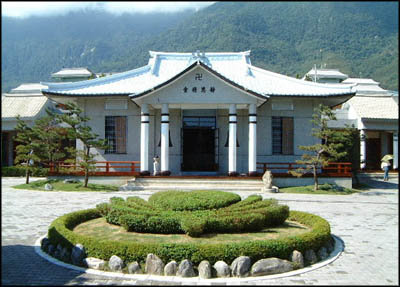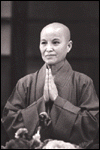![]()
About Berkeley Tzu-Ching
History
The Tzu Chi SF college group was formed on October 7, 1995. It became the Berkeley TC Chapter on the UC Berkeley campus during Spring of 1996, a one of the very few English based TC groups. The main mission is to introduce Tzu Chi to more young adults and encourage the students in all kinds of ethnic groups to learn and to care for others while developing a noble character and a sound mind. The Berkeley Chapter has continued to create new ways of carrying across the teachings of Buddhism and Tzu Chi to our members. TC Berkeley has two focuses on cultural enrichment and community services. We have six kinds of activities this semester: hotmeal serves, convalescent home visits, mentally challenged kid visit, weekly tutoring program, weekly cultural discussion, health fair, special projects including sign language performance and fundraising for UNICEF. TC Berkeley core tries to add variety of the activities for members to participate and also to serve the Berkeley community as much as possible. We will introduce new activities to allow participants to reflect upon important principles and values through acts of giving to the community and to others. we hope the new members will be able to get a feel for the Tzu Chi objectives, spirits, principles, and culture.
How to Participate in Berkeley TC
There is no membership process: no application and no membership fee! To participate in Tzu Chi activities, all you have to do is sign up to our mailing list, so you will be informed about the upcoming events. Information of upcoming events will be sent via e-mail 3-4 days prior to the event. If you are interested, please sign up with our Public Relations officer. Come when you feel like joining us; you are always welcomed!
Tzu-Chi In General
"Tzu Chi" are Chinese characters which mean compassionate relief
. Following Buddha's teachings, this organization aspires and works to relieve all of those in need.
A Brief History of Tzu Chi:
The Buddhist Compassion Relief Tzu Chi Foundation was founded in 1966 in Taiwan by the Dharma Master Cheng-Yen and a small handful of disciples to help those in need. In 1966, when Master Cheng Yen went to see an ailing follower at a hospital in Hualien, she saw a pool of blood on the floor. She was told that an aboriginal woman had suffered from miscarriage, and had been turned away due to her inability to pay the security deposit. Upon hearing this, the Master felt tremendous sadness and disbelief, and thus resolved to help the poor and educate the rich.In the beginning, it was only funded with 50 cents of daily savings from thirty households and the disciples' additional wages of sewing one extra pair of baby shoes a day. Tzu Chi's ideals are to save those suffering and those going through difficulties through compassion and joyful giving. The Master strived for a world of kindness, compassion, joy, and equality, attainable by good deeds of charity. By 1996, Tzu Chi members numbered more th an four millions both in Taiwan and all around the world. Tzu Chi's main programs are in charity, medical assistance, education and culture as well as bone marrow donor programs and international disaster relief activities. Wherever there is a call for help, Tzu Chi members are always ready to mobilize their efforts and resources and come to the aid of those in distress.

Tzu-Chi's Missions
4 Major Missions:
- Charity
- Medicine
- Education
- Humanity
Eight Footprints:
- Charity
- Medicine
- Education
- Humanity
- Bone Marrow Donation
- Internation Relief
- Community Volunteers
- Environmental Protection
Tzu Chi - USA
The Tzu Chi Foundation USA was founded in early 1985. It represents the largest overseas chapter of the Taiwan-based organization. Presently, Tzu Chi is represented in the United States with more than forty branch and liaison offices and over 40,000 members. The Tzu Chi San Francisco office was established in October, 1994. The services provided include distribution of goods to the poor, emergency relief, caring for the elderly, providing assistance to the homeless, st workshop study, etc. On October 7, 1995, the Tzu Chi SF college group was formed. The main motivation is to introduce Tzu Chi to more young adults an encourage the students to learn and to care for others while developing a noble character and a sound mind. This semester, the college group will introduce Tzu Chi to the new members by holding six major activities. From these activites, we hope the new members will be able to get a feel for the Tzu Chi objectives, spirits, principles, and culture.
What is Tzu Ching?
TC means youths with compassion and joyous giving
, who abide to Tzu Chi principles and spirits to extend and carry out Tzu Chi missions on campus. In order to create cohesive support for their development, the Tzu Chi Collegiate Youth Association
was established. The members of this Group are called the compassionate youth
, or in Chinese, Tzu Ching (TC).

Tzu-Chi's Founder: Dharma Master Cheng Yen
Biography taken from "Still Thoughts" by Dharma Master Cheng Yen
Venerable Master Cheng Yen was born in the town of Ching-Sui (trans.: Clear Water), Taiwan, in 1937. When she was twenty-three years old, she left home life to become a Buddhist nun. The Master has always led a simple and virtuous life; in her frugality, she made candles and bean powder to maintain a living. In 1966, she established Compassion Relief Tzu Chi Foundation,
and for almost 30 years, this organization has concentrated its activities in the four major areas of charity, giving practical aid to the poor and spiritual encouragement to the rich. In 1991, the Master received the Phillipine Magsaysay Award. Living a simple life with only the basic necessities, the Master has actively pursued her work of helping the poor and teaching all to create and to cherish blessings. The Master's published writings include:
- "People Have Twenty Difficulties"
- "Returning to the Hometown of the Soul"
- "Joyful and At Ease"
- "Pure Wisdom"
Constitution for the Tzu Chi Buddhist Relief Organization
Article I: Name
The name of this organization shall be the Tzu Chi Buddhist Relief Organization It's abbreviation shall be TC
Article II: Mission
The organization exists to promote Buddhism on campus through community service
Article III: Membership
TC welcomes all those who are interested in Buddhism and/or community service to apply for membership. only currently registered students, faculty, and staff may be active for members to vote or hold office. The requirement for maintaining TC membership is involvement in three activities per term. The length of terms are described in the article on elections. The activities include all TC general meetings and events. At the end of each term, members who do not meet this requirement automatically lose membership. We will not haze according to California State Law; we will not restrict membership based upon race, color, national origin, gender, sexual orientation, age, religion, or handicap.
Article IV: Organizational Structure
TC is organized through four main committees: Executive, Buddhist Studies, Activities, and Public Relations. Each committee is led by an elected chairperson. The responsibilities of each committee is described as follows.
The Executive Committee shall set meeting agendas, conduct meetings, hold elections, keep records of meetings, keep current profiles of all members and the committees that they are a part of, manage financial activities, collect activities report from other committees, and coordinate all other committees.
The Buddhist Studies Committee shall organize activities that promotes learning of Buddhist and Tzu Chi Principles. Activities may include discussions, lectures, mediation sessions, temple visits/retreats, and study groups. Additional responsibilities included mainintain the TC library of books and cassettes.
The Activities Committee shall plan all secular activities and community services. Activities may include planning visits to convalescent homes, picnics, benefit performances, bone marrow drives, fund raising, community clean-ups, etc.
The Public Relations Committees shall be the external arm of TC. They shall publicize TC activities through phone calls, electronic mail, flyers, bulletin boards, WEB page, etc. They shall also take photographs of TC events and maintain an album of the photographs. Lastly, they shall organize the recruiting effort by organizing tabling at Sproul Plaza and also holding a general meeting for new members at the beginning of each semester.
The responsibilities of the committee chairs are:
Plan activities and contact the Public Relations Chair to publicize them.
Carry out other duties as described above.
Maintain records, plans, and activities in a binder. After an activity, the responsible committee shall file a report with the Executive Committee.
Recruit committee members as needed to carry out the committee responsiblities described above
Contact the Public Relations Chair to publicize events.
Article V: Elections
Coordinators will be elected before the end of every term. Members can nominate other members, including themselves, for positions. The outcome will be determined by a simple majority. In case of a tie, the Executive Committee Chair shall appoint the new chair from the nominees locked in the tie. The terms are (1) Summer and Fall (June to December) and (2) Winter (January to May).
Article VI: Meetings
Meetings shall be held on a bi-weekly basis throughout the semester
A quorum shall consist of the majority of the members at the meeting
Special emergency meetings can be called by the coordinators
Article VII: Making Amendments
The following is the procedure to create an amendment:
Announce the intent to add an amendment during a general meeting
The proposed amendment shall be proposed and discussed during the next general meeting
After discussion of the proposed amendment, a vote shall be taken among the committee chairs. If the proposal receives the majority vote ( > 50% ), it becomes an amendment.
Article VIII: Dissolution
To dissolve this organization, it has to be voted and approved by all the committee coordinators. In the event of dissolution, all unspent funds shall be donated to non-profit charity groups after meeting all fiscal liabilities of this organization